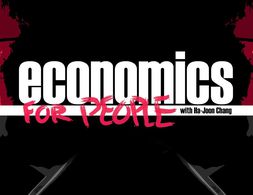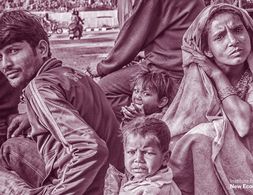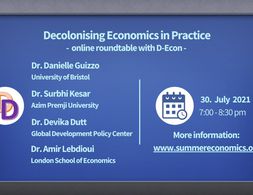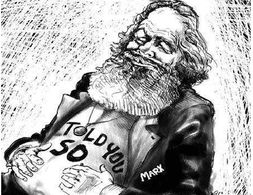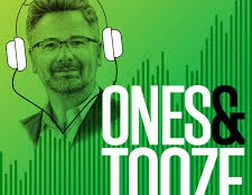✕
358 results
Representing everyone An Analysis of the Representation of Migrant Women by official Labour Organizations in Germany Author Tess Herrmann Review Deborah Sielert This is an essay of the writing workshop Gender and the Economy Perspektives of Feminist Economics published on 17 May 2017 updated on 16 August 2017 Why we …
In this essay the authors argue for a wider concept of care work that includes community building, civic engagement and environmental activism. On the basis of the case of Cargonomia, a grassroot initiative in Budapest, they show that such a wider concept of care work could allow for different narratives that promote sustainable lifestyles with a milder environmental and social impact on the planet and its communities.
In this essay the author reviews empirical studies in economics that analyze factors behind the rise of nationalist and populist parties in Western countries. He stresses that economic factors (e.g., trade shocks and economic crisis) play a crucial role in the rise of populist parties; however, the discussion of mechanisms driving this trend remains unsatisfying
An essay of the writing workshop on contemporary issues in the field of Nigerian economics: In Nigeria, it appears that there is nothing in the constitution, which excludes the participation of women in politics. Yet, when it comes to actual practice, there is extensive discrimination. The under-representation of women in political participation gained root due to the patriarchal practice inherent in our society, much of which were obvious from pre-colonial era till date.
Stratification economics is defined as a systemic and empirically grounded approach to addressing intergroup inequality. Stratification economics integrates economics, sociology and social psychology to distinctively analyze inequality across groups that are socially differentiated, be it by race, ethnicity, gender, caste, sexuality, religion or any other social differentiation.
The premise of this workshop is that we, as knowledge producers - especially within westernized universities (Grosfoguel, 2013), are significantly implicated in neoliberal imaginaries that are often in service of hierarchical, binary, competitive and linear narratives of growth as civilizational progress.
This course is designed to provide students with an understanding of work-related gender issues and to enable students to analyze the issues using the tools of economics.
Health Economics traditionally involves two distinct strands. One focuses on the application of core neoclassical economic theories of the firm, the consumer and the market to health-seeking behaviour and other health issues. It suggests a role for government intervention only in the case of specific market failures (for example externalities, asymmetric information, moral hazard, and public goods) that distort market outcomes. The second strand is evaluation techniques, used to assess the cost effectiveness of competing health interventions.
This syllabus provides an overview of the contents of the course "Understanding Economic Models" at the University of Helsinki.
Ever wondered why some countries are rich and others poor Or why some people believe hard work results in upward mobility and others don t To answer these questions you need to see the world sociologically In this introductory sociology course we will explore the concerns of an interconnected global …
Feminist economics focuses on the interdependencies of gender relations and the economy. Care work and the partly non-market mediated reproduction sphere are particularly emphasised by feminist economics.
Complexity economics focuses on interactions and interdependencies between individuals and structures in economic systems. Those are systems of organised complexity. High importance is given to the analysis of networks.
Evolutionary economics focuses on economic change. Hence processes of change such as growth, innovation, structural and technological change, as well as economic development in general are analysed. Evolutionary economics often gives emphasis to populations and (sub-)systems.
Examine what would happen if we were to deploy blockchain technology at the sovereign level and use it to create a decentralized cashless economy. This book explains how finance and economics work today, and how the convergence of various technologies related to the financial sector can help us find solutions to problems, such as excessive debt creation, banks getting too big to fail, and shadow banking.
A comprehensive account of how government deficits and debt drive inflation
The core idea of ecological economics is that human economic activity is bound by absolute limits. Interactions between the economy, society and the environment are analysed, while always keeping in mind the goal of a transition towards sustainability.
Exploring Economics Dossier on the economic fallout of the COVID-19 pandemic and the structural crisis of globalization. COVID-19 encounters a structural crisis of globalization and the economic system that drives it, with an uncertain outcome. We asked economists worldwide to share with us their analysis of current events, long-term perspectives and political responses. The dossier will be continuously expanded.
Marx Reloaded is a cultural documentary that examines the relevance of German socialist and philosopher Karl Marx s ideas for understanding the global economic and financial crisis of 2008 09 The crisis triggered the deepest global recession in 70 years and prompted the US government to spend more than 1 …
Modern Monetary Theory and Practice: An Introductory Text is an introductory textbook for university-level macroeconomics students. It is based on the principles of Modern Monetary Theory (MMT).
It has become a contentious term in- and outside of economic policy: austerity. Allegedly the culprit behind the shortfalls of governments' reaction to the Great Financial Crisis, the policy makes for a spirited debate.
In this book, Blakely tells us a story of the class nature of capitalism, in which she centers the role of the financial sector and its rapid growth.
Ricardo Hausmann says the new industrial policy is an information revelation process about the state of possibilities, the nature of the obstacles and figuring out whether you can sort out the obstacles so that these new activities can take over.
Economics has long been the domain of the ivory tower, where specialized language and opaque theorems make it inaccessible to most people. That’s a problem.
Inequality is an issue we all face every day, from income disparities to gender discrimination. In this first lecture in the Institute for New Economic Think...
Exploring Economics, an open-source e-learning platform, giving you the opportunity to discover & study a variety of economic theories, topics, and methods.
Exploring Economics, an open-access e-learning platform, giving you the opportunity to discover & study a variety of economic theories, topics, and methods.
Recent events such as the Black Lives Matter protests the the murder of George Floyd in Minneapolis US and the toppling of the statue of Edward Colston in Bristol UK have exposed existing racism colonialism and sexism in our society and in Economics While calls to improve diversity in Economics …
This article briefly examines Marx s profound contribution in the political economic thought It provides the historical foundations of Marxian economic thought based on the contemporary situation as well as the state of economic thought at that time Lastly it discusses the volumes of Marx s contribution as well as …
In this roundtable conversation, Post-Colonialisms Today members, Omar Ghannam, Kareem Megahed and Tetteh Hormeku-Ajei, look to policies from early post-independence Africa to tackle issues exacerbated by the COVID- 19 pandemic.
“Economics is the science which studies human behaviour as a relationship between ends and scarce means which have alternative uses1.” This is how Lionel Robbins came to define economics in the early 1930s and there is a good chance that many of you heard a variant of this definition in your first Economics 101 lecture.
This course focus on the behaviour of individuals from an pluralist economic and an interdisciplinary bevavioural science apprach.
Western sanctions on Russia after its invasion of Ukraine quickly led the Ruble to lose more than 45 percent of its value. But these days, the Russian currency is back to its pre-war value. Cameron and Adam explain the turnaround and discuss what it means for the war.
We use cookies on our website. Click on Accept to help us to make Exploring Economics constantly better!




















